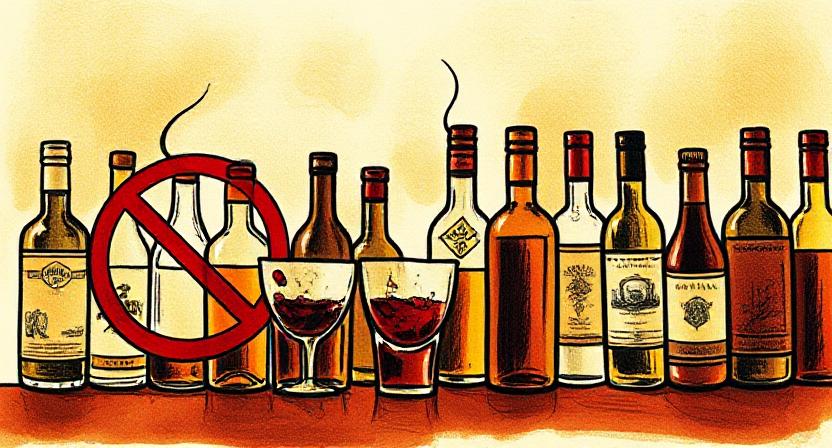In Islamic jurisprudence, the consumption of alcohol is generally prohibited. However, scholars have identified specific circumstances under which the use of alcohol-containing substances may be permissible, particularly in medical contexts or situations of necessity. Below is an overview of notable fatwas and scholarly opinions addressing these exceptions.
1. Medical Use of Alcohol-Based Medications 💊
Several Islamic authorities permit the use of alcohol-containing medications under specific conditions that prioritize health and necessity:
- Islamic Fiqh Council (OIC) and Muslim World League (MWL):
Permissible if:- The medication is essential for treatment.
- No effective, alcohol-free alternatives are available.
- The dosage does not cause intoxication.
- Al-Lajna ad-Dāʾima lil-Buḥūṯ al-ʿIlmiyya wal-Iftā (Saudi Arabia):
Use of alcohol in medicine is allowed only when:- The alcohol content is minimal and non-intoxicating.
- Intoxication is not a risk at prescribed dosage.
- Dar al-Ifta al-Misriyyah (Egypt):
Medicines derived from impure substances (including alcohol) may be used under expert medical supervision, if pure alternatives are unavailable. - Darul Uloom Trinidad and Tobago:
Medication such as alcohol-based cough syrups is allowed when:- Prescribed by a trustworthy physician.
- No suitable halal alternative exists.
- The medication is strictly for treatment purposes.
- Ibn Taymiyyah (Hanbali Scholar):
Permitted external use of alcohol for:- Cleaning wounds.
- Killing bacteria.
- Application in creams or lotions.
2. The Principle of Necessity (Ḍarūra) in Islamic Law 🆘
Islamic law allows prohibited actions in extreme cases where preservation of life is at stake. Alcohol consumption may be temporarily allowed under the following conditions:
- Imam Al-Nawawi (Shafi‘i school) in al-Majmu’: “If a person fears death from thirst and finds nothing but wine, it is permissible for him to drink enough to save himself.”
Key Guidelines:
- Ḍarūra is not a loophole: It applies only in life-threatening or extremely urgent situations.
- Intentions matter: The act must be purely for necessity, not convenience or enjoyment.
- Limited and temporary: The permissibility ends once the necessity no longer exists.
3. Industrial and Chemical Use 🏭
Alcohol in non-consumable industrial products is generally permitted when it serves a non-intoxicating purpose:
- Dar al-Ifta al-Misriyyah (Egypt):
Permits the use of ethanol in:- Perfumes,
- Cleaning agents,
- Hand sanitizers,
provided it does not intoxicate or serve a recreational purpose.
- Ibn Taymiyyah and Ibn Qayyim:
Considered alcohol that is chemically altered, evaporated, or denatured to be non-najis (not ritually impure), thus permissible in industrial applications.
4. Accidental Consumption or Trace Amounts 🥣
Trace quantities of alcohol, often present in processed foods, may be tolerated under strict conditions:
- Mufti Taqi Usmani:
Allows trace amounts of alcohol in food products if:- They do not intoxicate.
- They are not added for pleasure or recreational effect.
- European Council for Fatwa and Research (ECFR):
Permits up to 0.5% alcohol in processed foods, provided:- The alcohol is not added deliberately to intoxicate.
- No halal alternative is reasonably available.
5. Legal Pressure or Coercion ⛓️
In situations of coercion or legal pressure, consumption or handling of alcohol may be excused under specific guidelines.
- Classical Jurists (e.g., Al-Shawkani, Ibn Hazm):
Affirm permissibility when:- A Muslim is forced to consume or serve alcohol under genuine threat (e.g., imprisonment, war, or occupation).
- Only the minimal necessary amount is consumed to prevent harm.
- Qur’anic Basis: “Whoever is compelled by necessity without willful disobedience nor transgressing due limits—there is no sin upon him.” (Surah Al-Baqarah 2:173)
6. Teaching, Research, and Laboratory Work 🔬
Handling or analyzing alcohol in educational or professional settings is permitted under certain conditions:
- Proper precautions and ethical guidelines are followed.
Islamic Medical Association of North America (IMANA) and Islamic Fiqh Academy:
Permit the use of alcohol in:
- Scientific experiments,
- Medical research,
- Laboratory settings,
as long as: - The alcohol is not consumed for intoxication.
⚖️ Summary Table
| Case | Ruling | Conditions |
|---|---|---|
| Medical use | Permitted | No halal alternative, must be prescribed |
| Survival (e.g., thirst) | Permitted | Only to the point of survival |
| Industrial use (e.g., sanitizer) | Permitted | Non-ingestible, non-intoxicating |
| Trace amounts in food | Permitted | Not added intentionally to intoxicate |
| Under coercion | Permitted | Genuine threat, minimal required use |
| Lab/research use | Permitted | Non-recreational, necessary |
Conclusion
Islamic rulings surrounding alcohol are firm in their prohibition of recreational use. Yet, the tradition also recognizes life’s complexities and allows for flexibility when necessary. Medical need, survival, industrial usage, and coercion can justify limited exceptions, all grounded in the overarching Shariah principle of preventing harm and hardship.
Muslims facing such dilemmas are encouraged to consult qualified scholars and local fatwa bodies to ensure their choices are in harmony with Islamic ethics and jurisprudence.
Related Articles:
https://clitoralwellness.com/the-best-menstrual-cups-of-2025/
https://acnecuring.com/best-home-remedies-for-shrinking-acne-scars/




